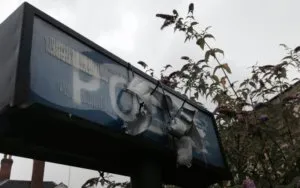The government has failed to act to protect disabled people from the risk of fire in high-rise and other residential buildings, nearly four years after the Grenfell Tower tragedy, say campaigners.
Disabled campaigners and allies have shared an open statement – calling for urgent and long-overdue action – with the home secretary, Priti Patel, and the housing, communities and local government secretary, Robert Jenrick.
Organisations including Disability Rights UK, Claddag, a leaseholder disability action group, and the Grenfell Next of Kin group, say the government has failed to implement crucial recommendations made at the end of the first phase of the Grenfell Tower Inquiry in October 2019.
And they warn that disabled lease-holders are living in fear of losing their homes because of the high cost of removing dangerous cladding from residential buildings.
The Grenfell Tower fire, on 14 June 2017, led to the loss of 72 lives, including many disabled residents who died after public bodies failed to plan how they would evacuate their homes in the event of a fire.
In October 2019, the inquiry recommended that owners and managers of high-rise residential buildings be legally required to draw up evacuation plans, to be given to the fire and rescue service and also stored in an information box in the building.
It also recommended that they should prepare personal emergency evacuation plans (PEEPs) for all residents who may find it difficult to “self-evacuate”, and to keep up-to-date information about these residents and their PEEPS in the information box.
The new open statement calls for these two measures to be “urgently” implemented.
But it also says these measures should be applied to all disabled residents living on the upper floors of residential buildings, and not just those in high-rise buildings, while such buildings should have to be provide equipment that would enable disabled residents to evacuate independently and safely.
Sarah Rennie, co-founder of Claddag, said: “The pace at which the government is reviewing evacuation planning is horrifying, particularly when many disabled people are living in buildings known to be riddled with fire defects.
“The message is clear: our lives are deemed less valuable. ‘Stay put’ is not deemed safe so why is it ok for us?”
Fazilet Hadi, Disability Rights UK’s head of policy, said: “It is now over 18 months since the Grenfell Tower Inquiry recommended that building owners and managing agents should have a legal duty to prepare personal emergency evacuation plans for disabled residents unable to self-evacuate.
“It is completely unacceptable that thousands of disabled residents continue to live in fear of fire.”
The new statement also calls for government action on the “distress and hardship” being caused to disabled leaseholders facing the high cost of removing dangerous cladding from residential buildings, and the costs of continuing to live in dangerous buildings.
Some disabled leaseholders are being harassed by other residents over the cost of equipment that would enable them to escape from a fire, it says.
Hadi said it was “unjust that disabled leaseholders should fear losing their adapted homes or be asked to contribute to bills for remedial works that they can’t afford and that aren’t their responsibility”.
Among other organisations signing the statement are disabled people’s organisations Disabled People Against Cuts, Greater Manchester Coalition of Disabled People, Disability Sheffield, Inclusion London, Spinal Injuries Association and Sisters of Frida.
Asked to respond to the statement this week, a government spokesperson said: “We are doing everything in our power to implement the Grenfell Inquiry phase one recommendations in the most practical, proportionate and effective way to ensure such a tragedy can never happen again.
“We continue to work with disability groups to improve accessible housing and to develop improved guidance for evacuation.
“Our £5 billion funding will protect those in the highest risk buildings from unaffordable costs, but does not absolve building owners of the responsibility to ensure their buildings are safe.”
The latest detailed update on the government’s progress in implementing the inquiry’s recommendations was published in April.
Ministers have said they will publish revised statutory guidance on evacuating disabled people and will seek further views on PEEPs, although it is not yet clear when this will happen.
The government said in February that it would “fully fund the cost of replacing unsafe cladding for all leaseholders in residential buildings 18 metres (six storeys) and over in England”, while a new scheme would guarantee that no leaseholder in a building between 11 and 18 metres in height would have to pay more than £50 a month towards the cost of removing unsafe cladding.
Picture: Close-up of Grenfell Tower with banners in June 2018 (c) by Carcharoth is licensed under Creative CommonsAttribution-Share Alike 4.0 International
A note from the editor:
Please consider making a voluntary financial contribution to support the work of DNS and allow it to continue producing independent, carefully-researched news stories that focus on the lives and rights of disabled people and their user-led organisations.
Please do not contribute if you cannot afford to do so, and please note that DNS is not a charity. It is run and owned by disabled journalist John Pring and has been from its launch in April 2009.
Thank you for anything you can do to support the work of DNS…

 Disabled people receiving care were ‘ignored by design’ during the pandemic, Covid inquiry hears
Disabled people receiving care were ‘ignored by design’ during the pandemic, Covid inquiry hears Ministers are considering further extension to disability hate crime laws, after pledge on ‘aggravated’ offences
Ministers are considering further extension to disability hate crime laws, after pledge on ‘aggravated’ offences ‘We will not give a single inch,’ disabled activists vow, as Kendall publishes disability cuts bill
‘We will not give a single inch,’ disabled activists vow, as Kendall publishes disability cuts bill